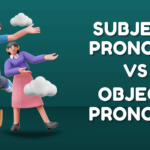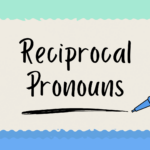Reflexive pronouns are like linguistic mirrors. They reflect actions back to the subject, emphasizing that the subject is doing something to themselves. In this article we will find what reflexive pronouns are and how to use them?
What are Reflexive Pronouns?
Reflexive pronouns are a specific type of pronoun used when the subject and the object of a sentence refer to the same person or thing. These pronouns are formed by adding “-self” or “-selves” to the basic personal pronouns, depending on the number and gender of the subject.
| Personal Pronoun | Reflexive Pronoun |
|---|---|
| I | Myself |
| You | Yourself |
| He/She/It | Himself/Herself/Itself |
| We | Ourselves |
| You (plural) | Yourselves |
| They | Themselves |
How to Use Reflexive Pronouns?
As Direct Objects:
Reflexive pronouns are commonly used as direct objects when the action of the verb reflects back onto the subject.
- Example: She washed herself before the party.
- Example: They congratulated themselves on the successful project.
Emphasizing the Subject:
Reflexive pronouns are used for emphasis, drawing attention to the subject of the sentence.
- Example: I, myself, witnessed the incident.
- Example: You should take care of yourself.
After Certain Prepositions:
Reflexive pronouns follow specific prepositions such as “by,” “with,” or “among.”
- Example: He was proud of himself for the accomplishment.
- Example: She shared the news with herself first.
Intensive Pronouns:
Reflexive pronouns can also function as intensive pronouns, adding emphasis to a noun in the sentence.
- Example: The chef prepared the meal himself.
- Example: The students built the project themselves.
How Reflexive Pronoun Use in Sentences?
Here are some examples of using reflexive pronouns in sentences:
- She treated herself to a spa day after a stressful week.
- They enjoyed themselves at the carnival.
- The president himself addressed the nation.
- You should believe in yourself.
- He looked at himself in the mirror.
- They divided the tasks among themselves.
Frequently Asked Questions (FAQs) about Reflexive Pronouns:
1. What are reflexive pronouns and how are they used?
Reflexive pronouns, like “myself” and “yourself,” reflect actions back to the subject in a sentence. They are utilized as direct objects, for emphasis, after certain prepositions, and can function as intensive pronouns, adding emphasis to a noun. Examples include “She treated herself to a spa day” and “The president himself addressed the nation.”
2. What are the common reflexive pronouns?
The common reflexive pronouns include: myself, yourself, himself, herself, itself, ourselves, yourselves, and themselves.
3. When do I use reflexive pronouns as direct objects?
Reflexive pronouns are used as direct objects when the action of the verb reflects back onto the subject. For example, “She dressed herself for the occasion.”
4. How can reflexive pronouns be used for emphasis?
Reflexive pronouns are used for emphasis by drawing attention to the subject of the sentence. For example, “I, myself, completed the entire project.”
5. What is the difference between reflexive pronouns and intensive pronouns?
While reflexive pronouns reflect the action back to the subject, intensive pronouns are used solely for emphasis, adding emphasis to a noun in the sentence. For example, “She baked the cake herself” (reflexive) vs. “She herself baked the cake” (intensive).
6. Can reflexive pronouns be used in the third person singular?
Yes, reflexive pronouns in the third person singular include “himself,” “herself,” and “itself.” For example, “The cat groomed itself.”
7. Are there specific rules for using reflexive pronouns with prepositions?
Reflexive pronouns are commonly used with certain prepositions, and their usage depends on the context. For instance, “He is proud of himself” or “She is talking to herself.”
8. Can reflexive pronouns be used in questions and commands?
Yes, reflexive pronouns can be used in questions and commands.
For example, “Did you enjoy yourself at the party?” or “Help yourselves to some snacks.”
Conclusion:
Reflexive pronouns are important for creating sentences that make sense. They help us talk about actions that someone does to themselves. By understanding their definition, usage, and examples, you can improve your proficiency in using reflexive pronouns in communication.


